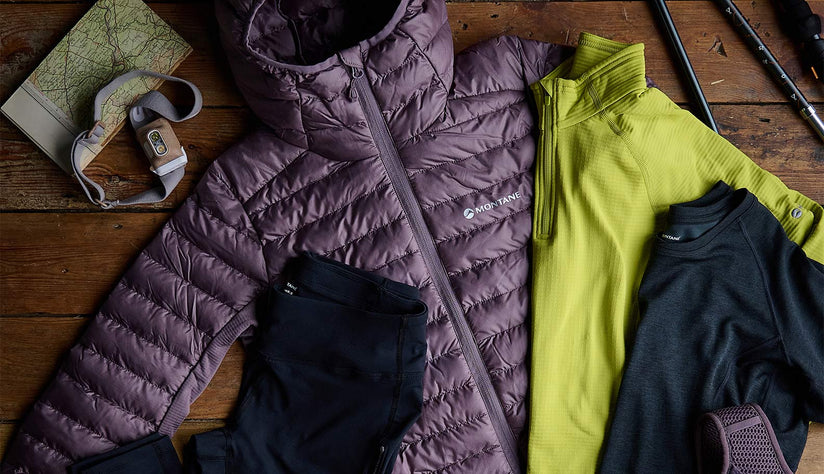At Montane immersing ourselves in raw nature is where we have always felt happiest. It’s why for over 30 years we have engineered outdoor clothing and equipment to help you explore more of the world’s wild places with ease. In short, we believe there’s no better way to lift the spirits than getting outside on an adventure.
Happiness comes in many forms and what makes you happy differs person-to-person. But there are a few common factors that can help aid your overall sense of wellbeing, including managing your stress levels, improving your self-esteem and of course doing things that are fun!
Whilst the positive physical benefits of exercise have long been widely known, in recent years, there has been a growing focus on how this can affect us mentally too. More and more studies are scientifically proving how nature and exercise have a positive impact, providing a powerful tool to help us navigate particularly challenging times.
Curious to find out more, we take a closer look to understand how our brains are wired to get outside and get active and, in turn, how you can live a happier life…

Nature, life's natural de-stresser
According to UK charity Mind, “Spending time in nature has been found to help with mental health problems such as anxiety and depression.” This can be well demonstrated by the COVID-19 pandemic, where nature helped us cope with the ongoing stress of the unprecedented situation. In the UK, daily walks boomed, becoming a lifeline for millions as we navigated the daily unknown.
To quantify nature’s powerful effects on the brain, let’s look at a Japanese study led by researchers Bum Jin Park and Yoshifumi Miyazaki. They sent 280 participants for a walk in 24 forests, whilst the same number of volunteers walked around urban city centres. The results were impressive, with the forest walkers showing a 16% decrease in the stress hormone cortisol. Their heart rates were also recorded as lower than their urban explorers. Turns out the Japanese art form of forest bathing has significant scientific merit after all!
Immersing yourself in nature can come in many forms, whether you’re looking to head high up into the mountains for a multi-day adventure, take your climbing outside for a day at the crag, or by simply enjoying a stroll through your local park. No matter what motivates you to get outside, within 20-minutes of accessing a green space, it has been proven you can begin reaping the rewards.

The ‘runner's high’ unpacked
Running is one of the most popular sports in the world and this hugely accessible activity comes with a plethora of benefits. Aside from being a great way to help you get fitter, a recent study by the Glasgow Caledonian University revealed a staggering 89% of 8,000 Parkrun participants and Strava members said that regular running made them happier.
One reason for this could be the widely regarded ‘runners high’ which is believed by some to produce a state of euphoria post hitting the trail. Breaking this down, once you hit your stride your body begins to release hormones called endorphins. Endorphins are neurochemicals that act on the same part of your brain as opioids, like morphine. This gives them the nickname of “feel-good” chemicals.
Running also provides an opportunity to boost your self control. Studies in Nottingham and Lithuania have shown that a runner’s ‘executive functions’ worked harder after a run. To break this down in layman's terms, executive functions help with things like managing your emotions and tuning out distractions. Neuroscientist Ben Martynoga discusses this more in this dedicated podcast which discusses the connection between running and the brain.
Eager to get running? Whether you’re signed up for a marathon this year, just getting started with the help of couch to 5k or you’re an ultra running pro - getting out the door can often be the hardest part of your run. Get motivated with these handy tips or find out why our Montane community loves to run.
Boosting self-esteem by climbing
Climbing has seen a surge in interest in recent years, no doubt bolstered by the jaw-dropping success of Alex Harnold’s ascent of El Capitan, captured on camera in the Oscar-winning Free Solo film. This fun, problem-solving sport offers those keen to give it a go the opportunity to reach new heights, whilst strengthening your body and mind in multiple ways.
Anyone who has been to their local climbing wall will know what an all-body workout climbing is…and remember the burning ache in your arms after your first session! But alongside a physical workout, increasing evidence also suggests that there are mental benefits you experience too. This includes clearing your mind of stress, boosting your confidence and, in turn, improving your self-esteem.
For those in need of more convincing take a look at this story from #Teammontane climber Grace Shepherd - your chance to hear how she found hope and healing in the climbing community. There is certainly more research to be done on the mental benefits of climbing, but it’s not hard to see why so many people are increasingly turning to the sport as a way to get fit, have fun and unwind.
Want to learn the ropes? We recommend taking a look at our guide to bouldering to get started and booking in a session at your local climbing wall to get to grips with the basics before heading out to try in the great outdoors.
















